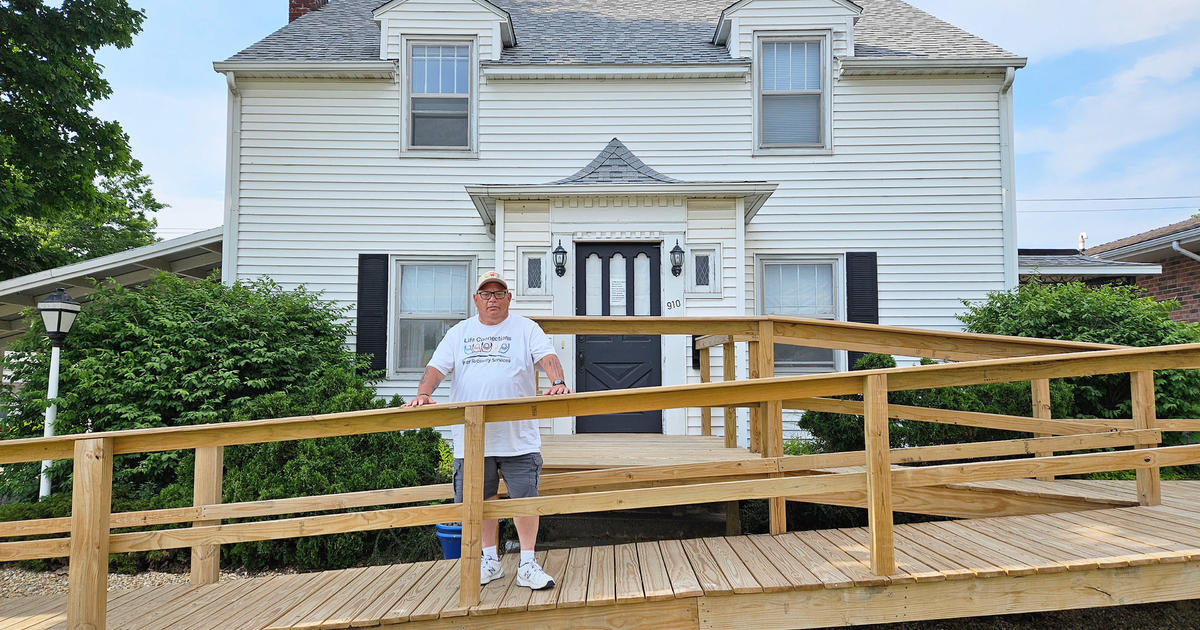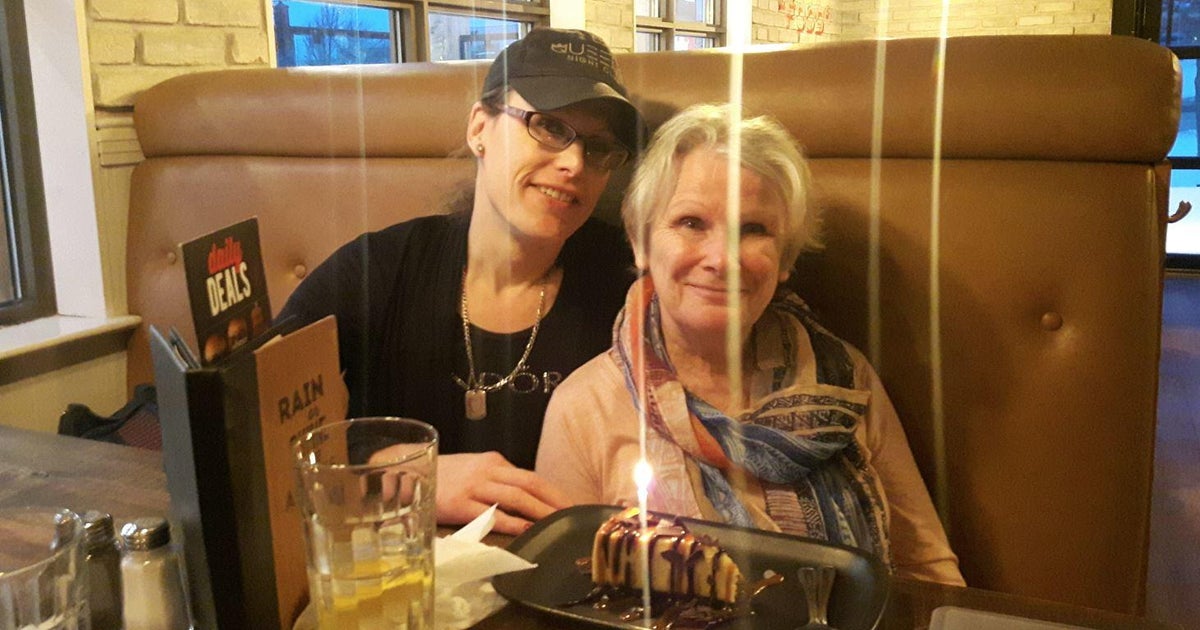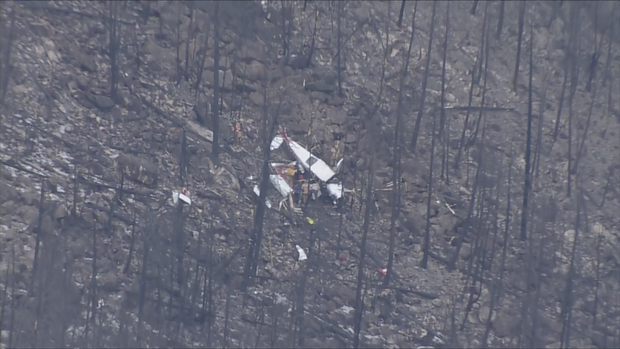CBS News
Mental health respite facilities are filling care gaps in over a dozen states

If you or someone you know may be experiencing a mental health crisis, contact the 988 Suicide & Crisis Lifeline by dialing “988,” or the Crisis Text Line by texting “HOME” to 741741.
Aimee Quicke has made repeated trips to emergency rooms, hospitals, behavioral health facilities, and psychiatric lockdowns for mental health crises — including suicidal thoughts — since she was 11.
The 40-year-old resident of Le Mars, Iowa, has bipolar and obsessive-compulsive disorders. “Some of the visits were helpful and some were not,” she said. “It was like coming in and going out and just nothing different was happening.”
Then she heard about Rhonda’s House, a rural peer respite program that opened on the other side of the state in 2018, through acquaintances in her community.
That facility, and dozens of others like it established nationwide over the past 20 years, offers a short-term, homelike, nurturing environment for people who are experiencing a mental health crisis but don’t need immediate medical attention. At respites, patients are treated like guests, proponents say, and can feel heard and keep their dignity without having to relinquish their clothes and other belongings.
During her weeklong stay at Rhonda’s House, which founder and executive director Todd Noack referred to as “a bed-and-breakfast facility for emotional distress,” Quicke made many breakthroughs, working on her self-esteem and gaining better coping skills. If she hadn’t found the program, she said, “I don’t think I would have come out of 2020.”
Public health professionals say respite facilities can potentially play a big role in addressing a national mental health crisis that accelerated dramatically during the COVID-19 pandemic, especially when it comes to suicide prevention.
“It’s a really important piece of the larger puzzle of how to improve health care and reduce suicide risk, because there is a ‘traffic jam’ in suicide prevention,” said Jane Pearson, chair of the National Institute of Mental Health Suicide Research Consortium.
Lisa Bartels
Respites rely on trained peers to provide care, and often serve patients who might otherwise visit overburdened ERs, psychiatric institutions, and therapists. Today there are 42 community-based respite programs spread across 14 states, including new ones opened recently in Tacoma, Washington, and Grand Rapids, Michigan. Most are nonprofits governed by a patchwork of state guidelines, and they’re funded by a mixture of local, state, and federal grants.
Experts say the programs fill a void, though there is little hard data on their effectiveness. Paolo del Vecchio, director of the Office of Recovery at the federal Substance Abuse and Mental Health Services Administration, said peer-run respites have proven themselves as an “evidence-based model of care,” with positive effects including reduced hospitalizations and increased engagement with community support services.
A 2015 study published online in the journal Psychiatric Services found that people who sought respite were 70% less likely to use inpatient emergency services than non-respite users.
Still, del Vecchio said, more research is needed to analyze how the programs are working and troubleshoot problems. SAMHSA is conducting a cost-benefit analysis of respite programs that officials hope to release this summer.
Pearson said she would like to see more research on who uses respites, how they are advertised, clients’ reasons for seeking them, and whether they deliver what they promise.
Respites can be especially important in rural America, where suicides increased 46% from 2000 to 2020, compared with 27.3% in urban areas, according to the Centers for Disease Control and Prevention. Rural residents also have 1½ times the rates of ER visits for self-harm as urban residents.
Del Vecchio hopes greater awareness can help bring the promising respite approach to the states with the highest suicide rates, including Wyoming, Montana, Alaska, and New Mexico.
Rhonda’s House, in Dewitt, Iowa, has provided care to 392 people over the past five years, and recently moved into a three-story, five-bedroom house with two baths. Peer specialists in Iowa must complete 30 hours of training plus six hours of ethics counseling, and then work 500 hours to become eligible to take a state certification test.
For Quicke, Rhonda’s House was a lifesaver during a brutal 2020. The pandemic had isolated her from her support system, her brother-in-law died, her long-term partner moved out, and her mother had open-heart surgery.
“There was a lot of chaos. A lot of family fights broke out. That’s when I took off — packed a bag and left for respite,” said Quicke. “There was nowhere else closer to go.”
She drove six hours from her home to Rhonda’s House, where she found 24-hour help that you “just can’t get from an emergency room or hospital.”
Unlike traditional hospital staffers, peers are available to speak with guests whenever they are needed, which Quicke appreciated since she has “a lot of panic and anxiety in the night and it’s frightful.” She also found it easy and comforting to speak with peers with “lived experience,” or firsthand experience with mental health challenges.
Allowing people to reach out for help without being judged is a crucial feature of the respite model, said Paul Pfeiffer, a psychiatrist at the University of Michigan’s medical center. He cautioned against regulations that would make them more like hospitals, noting that many people in trouble avoid getting help because they fear being locked up in a psychiatric facility.
Quicke said she learned a lot during her stay at Rhonda’s House. “I always thought I was co-dependent. I learned I just need me and my dogs. I learned wellness tools and that I can be strong and resourceful and resilient,” she said. She described being more conscious of her triggers and said she had “more routines to help with sleep hygiene.”
When Quicke left, respite staffers connected her with community resources close to her home, near the Nebraska border. They also encouraged her to call if she needed help again and told her she could return for another stay after 60 days — giving her time to work through her challenges and freeing up space for others in the meantime.
“Peer respite works 8 out of 10 times,” said Noack, the executive director. “Some people do have to leave to get another level of care, but nothing is ever perfect.”
The average cost of staying at Rhonda’s House is $428 a day — far less than the thousands of dollars a hospital stay typically costs. Noack’s respite does not bill insurance but covers the cost with state and regional contracts, as well as donations, like many other respites.
Some respites receive Medicaid funding. As this type of care grows, more states will explore Medicaid and other funding sources, said del Vecchio.
A few weeks ago Quicke became discouraged after a job rejection. She thought about going back to Rhonda’s House but said she channeled what she learned there during her stay.
“I was able to use my coping skills to get through it,” she said.
KFF Health News, formerly known as Kaiser Health News (KHN), is a national newsroom that produces in-depth journalism about health issues and is one of the core operating programs at KFF — the independent source for health policy research, polling, and journalism.
CBS News
Marta’s Orlando Pride defeat Washington Spirit for their first NWSL title

Barbra Banda scored in the 37th minute to give the Orlando Pride their first National Women’s Soccer League championship with a 1-0 victory over the Washington Spirit on Saturday night.
Banda dribbled into the right side of the box and made a move past a defender before kicking the ball on the ground with her left foot and past the goalkeeper. She became the first player in the NWSL to score in each round of the playoffs.
The Pride’s Angelina was nearly called for a push before passing it to Banda, but the VAR determined that the play was fair.
Kyle Rivas / Getty Images
The Spirit (20-7-2) controlled the game and outshot the Pride 25-9, had two more shots on goal and held onto possession 58% of the time. Rosemonde Kouassi had Washington’s best chance in the 47 minute when she headed a ball from about 10 yards away.
Orlando’s win gave Brazilian star Marta her first NWSL title. The 38-year-old Marta, considered arguably the greatest female soccer player of all time, joined the Orlando Pride in 2017 but had never reached an NWSL championship game until this year.
“(It’s a) magic moment for me because I’ve been in this club for so long and (to) wait for this moment, you know, so it’s… I’m just enjoy every single moment,” she told CBS News Friday ahead of the game. “…This year become like the best year in my club life.”
Top-seed Orlando (21-6-2) went unbeaten in its first 23 matches, a league record. They beat the Kansas City Current in the semifinals before hoisting the trophy at CPKC Stadium, their home field.
Orlando is the first team since 2019 to win the Shield and the title in the same year.
Washington had won its last five playoff games when trailing at the half, but that streak was broken with this loss.
CBS News
2 killed in U.S. Civil Air Patrol plane crash near Palisade Mountain in Northern Colorado

Two people were killed and a third was injured when a U.S. Civil Air Patrol plane crashed in Colorado’s Front Range Saturday morning.
The small passenger plane with three people aboard crashed near Storm Mountain and Palisade Mountain west of Loveland around 11:15 a.m., according to the Larimer County Sheriff’s Office. The plane belonged to the Civil Air Patrol, the civilian auxiliary wing of the U.S. Air Force, and was on a routine aerial photography training mission when it went down, officials said.
Pilot Susan Wolber and aerial photographer Jay Rhoten were identified by CAP as those killed and co-pilot Randall Settergren was identified as the person injured. Settergren was airlifted to an area hospital by a National Guard helicopter, where he is undergoing medical care.
CBS
“The volunteers of Civil Air Patrol are a valuable part of the Department of Military and Veterans Affairs, and the lifesaving work they do on a daily basis directly contributes to the public safety of Coloradans throughout the state,” Maj. Gen. Laura Clellan, adjutant general of the Colorado Department of Military and Veterans Affairs, said in a statement Saturday.
“We are devastated to hear of the loss of Susan Wolber and Jay Rhoten, and the injury of Randall Settergren, during a training mission in Larimer County. Our thoughts and deepest condolences are with the families of those involved in the crash,” Clellan continued. “I would also like to thank all of the first responders who assisted with rescue efforts.”
Palisade Mountain is in Larimer County, about 20 miles west of Loveland and about 65 miles northwest of Denver. The area is part of the burn scar of the Alexander Mountain Fire, which burned almost 10,000 acres in over two weeks this past summer.
The crash happened about 200 feet below the summit of Palisade Mountain in an area that includes tall trees and steep hills as part of the mountain range. Rescue crews were heard on radio traffic working to find a landing zone for rescue helicopters. No structures were impacted by the crash.
The plane crashed in “very rugged” and “extensive and rocky terrain,” Ali Adams, a Larimer County Sheriff’s Office spokeswoman, said at a news conference. First responders had to hike out to the site and the sole survivor was “severely injured” when responders finally got to them.
Rescue efforts were ongoing at 3:15 p.m., according to Adams, and recovery efforts for the two deceased people’s bodies could take several days.
Several agencies responded, including the Loveland Fire Rescue Authority, Thompson Valley EMS and the National Guard.
The Larimer County Sheriff’s Office is the lead agency investigating the crash and the Federal Aviation Administration and National Transportation Safety Board will assist, according to Adams. The NTSB said it too was investigating the crash and identified the plane as a Cessna 182.
“This is one of those incidents that is really low frequency; it doesn’t happen really often, but unfortunately, our first responders have had more than their fair share of responses,” Adams said.
George Solheim lives in the area of the crash. He described conditions as “extremely windy” on Saturday and heard the plane just prior to the crash. He says he could hear “loud ‘throttle up/down’ immediately prior to sudden silence at (the) time of (the) crash. Couldn’t hear sounds of impact from here.”
Colorado Gov. Jared Polis extended his sympathy to the families of the victims in a statement Saturday evening:
“I’m saddened to hear of the loss of two dedicated Civil Air Patrol members, Pilot Susan Wolber and aerial photographer Jay Rhoten, who lost their lives in today’s crash and my thoughts are with their families, friends and colleagues. These individuals, along with survivor co-pilot Randall Settergren, who was injured, served the Civil Air Patrol as volunteers who wanted to help make Colorado a better, safer place for all. The State of Colorado is grateful for their commitment to service and it will not be forgotten. I also want to thank the first responders who assisted with the rescue and recovery efforts.”
CBS News
Fred Harris, former Democratic U.S. senator and presidential candidate, dies at 94

Fred Harris, a former U.S. senator from Oklahoma, presidential hopeful and populist who championed Democratic Party reforms in the turbulent 1960s, died Saturday. He was 94.
Harris’ wife, Margaret Elliston, confirmed his death to The Associated Press. He had lived in New Mexico since 1976.
“Fred Harris passed peacefully early this morning of natural causes. He was 94. He was a wonderful and beloved man. His memory is a blessing,” Elliston said in a text message.
Bettmann Archive/Getty Images
Harris served eight years in the Senate, first winning in 1964 to fill a vacancy, and made unsuccessful bid for the presidency in 1976.
“I am deeply saddened to learn of the passing of my longtime friend Fred Harris today,” Democratic New Mexico Gov. Michelle Lujan Grisham wrote in a post to social media. “Harris was a towering presence in politics and in academia, and his work over many decades improved New Mexico and the nation. He will be greatly missed.”
Democratic Sen. Martin Heinrich of New Mexico said in a statement that “New Mexico and our nation have lost a giant,” describing him as a “tireless champion of civil rights, tribal sovereignty and working families.”
It fell to Harris, as chairman of the Democratic National Committee in 1969 and 1970, to help heal the party’s wounds from the tumultuous national convention in 1968 when protesters and police clashed in Chicago.
He ushered in rule changes that led to more women and minorities as convention delegates and in leadership positions.
“I think it’s worked wonderfully,” Harris recalled in 2004, when he was a delegate to the Democratic National Convention in Boston. “It’s made the selection much more legitimate and democratic.”
“The Democratic Party was not democratic, and many of the delegations were pretty much boss-controlled or -dominated. And in the South, there was terrible discrimination against African Americans,” he said.
Harris ran unsuccessfully for the Democratic presidential nomination in 1976, quitting after poor showings in early contests, including a fourth-place win in New Hampshire. The more moderate Jimmy Carter went on to win the presidency.
Harris moved to New Mexico that year and became a political science professor at the University of New Mexico. He wrote and edited more than a dozen books, mostly on politics and Congress. In 1999 he broadened his writings with a mystery set in Depression-era Oklahoma.
Throughout his political career, Harris was a leading liberal voice for civil rights and anti-poverty programs to help minorities and the disadvantaged. Along with his first wife, LaDonna, a Comanche, he also was active in Native American issues.
“I’ve always called myself a populist or progressive,” Harris said in a 1998 interview. “I’m against concentrated power. I don’t like the power of money in politics. I think we ought to have programs for the middle class and working class.”
“Today ‘populism’ is often a dirty word because of how certain leaders wield power,” Heinrich said in his statement Saturday. “But Fred represented a different brand of populism — one that was never mean or exclusionary. Instead, Fred focused his work and attention on regular people who are often overlooked by the political class.”
Harris was a member of the National Advisory Commission on Civil Disorders, the so-called Kerner Commission, appointed by then-President Lyndon Johnson to investigate the urban riots of the late 1960s.
The commission’s groundbreaking report in 1968 declared, “our nation is moving toward two societies, one black, one white — separate and unequal.”
Thirty years later, Harris co-wrote a report that concluded the commission’s “prophecy has come to pass.”
“The rich are getting richer, the poor are getting poorer and minorities are suffering disproportionately,” said the report by Harris and Lynn A. Curtis, president of the Milton S. Eisenhower Foundation, which continued the work of the commission.
Norman Ornstein of the American Enterprise Institute said Harris rose to prominence in Congress as a “fiery populist.”
“That resonates with people…the notion of the average person against the elite,” Ornstein said. “Fred Harris had a real ability to articulate those concerns, particularly of the downtrodden.”
In 1968, Harris served as co-chairman of the presidential campaign of then-Vice President Hubert Humphrey. He and others pressed Humphrey to use the convention to break with Johnson on the Vietnam War. But Humphrey waited to do so until late in the campaign, and narrowly lost to Republican Richard Nixon.
“That was the worst year of my life, ’68. We had Dr. Martin Luther King killed. We had my Senate seatmate Robert Kennedy killed and then we had this terrible convention,” Harris said in 1996.
“I left the convention — because of the terrible disorders and the way they had been handled and the failure to adopt a new peace platform — really downhearted.”
After assuming the Democratic Party leadership post, Harris appointed commissions that recommended reforms in the procedures for selecting delegates and presidential nominees. While lauding the greater openness and diversity, he said there had been a side effect: “It’s much to the good. But the one result of it is that conventions today are ratifying conventions. So it’s hard to make them interesting.”
“My own thought is they ought to be shortened to a couple of days. But they are still worth having, I think, as a way to adopt a platform, as a kind of pep rally, as a way to get people together in a kind of coalition-building,” he said.
Harris was born Nov. 13, 1930, in a two-room farmhouse near Walters, in southwestern Oklahoma, about 15 miles from the Texas line. The home had no electricity, indoor toilet or running water.
At age 5 he was working on the farm and received 10 cents a day to drive a horse in circles to supply power for a hay bailer.
He worked part-time as a janitor and printer’s assistant to help for his education at University of Oklahoma. He earned a bachelor’s degree in 1952, majoring in political science and history. He received a law degree from the University of Oklahoma in 1954, and then moved to Lawton to practice.
In 1956, he won election to the Oklahoma state Senate and served for eight years. In 1964, he launched his career in national politics in the race to replace Sen. Robert S. Kerr, who died in January 1963.
Harris won the Democratic nomination in a runoff election against J. Howard Edmondson, who left the governorship to fill Kerr’s vacancy until the next election. In the general election, Harris defeated an Oklahoma sports legend — Charles “Bud” Wilkinson, who had coached OU football for 17 years.
Harris won a six-year term in 1966 but left the Senate in 1972 when there were doubts that he, as a left-leaning Democrat, could win reelection.
Harris married his high school sweetheart, LaDonna Vita Crawford, in 1949, and had three children, Kathryn, Byron and Laura. After the couple divorced, Harris married Margaret Elliston in 1983. A complete list of survivors was not immediately available Saturday.











GIPHY App Key not set. Please check settings